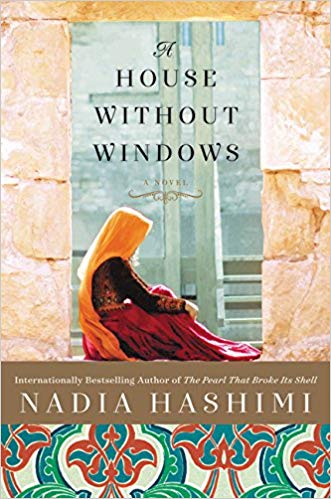
A House Without Windows [2016] – ★★★★
I am progressing with my YARC 2019 with this novel by an American author whose Afghan parents immigrated to the US from Afghanistan in the 1970s. In this tale, a terrible crime shook a small community in Afghanistan – Kamal, a husband and a father of four, has been found murdered with a hatchet plunged into his skull. At the scene of the crime is his wife Zeba who is covered in blood and numb with shock. But, was she really the one who committed the crime? Yusuf, a lawyer from the US, arrives to his native land Afghanistan and is immediately tasked with defending his reticent client Zeba, trying to seek justice in this seemingly open-and-shut case. This is a tale of two families – one traditional Afghan, rooted in its community, and another immigrant, with Nadia Hashimi making observations on the Afghan culture, Afghanistan’s criminal justice system and on the plight of women living in that country, paying a special tribute to their strength and resilience.
When Zeba was found at the scene of the crime in her own home, it was hard to think that anyone else could have been responsible for the murder of her husband, and she narrowly escaped vigilantism. Then, in jail, Zeba meets other three women who share a cell with her – Latifa, Nafisa and Mezhgan, and it becomes clear that many women in Chil Mahtab (a women’s prison in Kabul) are there for zina or crimes of sex outside marriage. We get the background story of Yusuf, a young lawyer, too, and his own familial situation, as his parents in the US are trying to seek a wife for him in Afghanistan. Yusuf is sceptical that he can do much about the case of Zeba because facts speak for themselves, but he also hopes that Zeba will cooperate and start talking. He starts to wonder – what is the real cause of her silence about the crime she is charged with?
Nadia Hashimi maintains suspense and intrigue well throughout the novel, maybe too well because half way through the book we know as much about the circumstances of the crime or who can be the real culprit as we did in the first chapter. Nashimi’s writing is also easy-to-read and fluid as she undoubtedly wants to demonstrate in her book what some women in Afghanistan suffer on a daily basis within their own families. We learn that Zeba’s marriage to Kamal was arranged, and many women in the country feel no control or independence in their lives from their births (first they have control coming from their families and then control coming from their husbands). It also transpires that Kamal was not an ideal husband, and Hashimi makes a particular emphasis on the fact that some women in Afghanistan live in homes with a “delicate balance of power” inside [Hashimi: 2016: 186], where “periods of peace [are] calms between storms”. It is precisely the principle of “leaving the family to their private matters” [2016: 250] that often leads to irreparable tragedies.
Alongside an insight into one Afghan family, we get an insight into the criminal justice system of a remote village in Afghanistan. Considering the case of Zeba, Yusuf thinks: “forensic science had a long way to go in Afghanistan; [he] knew he wouldn’t have the luxury of DNA tests. Fingerprints might have been a possibility, but no one had bothered to take any” [Hashimi, 2016: 211]. The prevalence of victim-blaming, especially in crimes of sexual nature, is also touched upon in this book, as well as the paramount principle of honour in the culture, village superstition and the power of religious belief.
⚖️ Nadia Hashimi’s A House Without Windows may be too slow, overcrowded with characters and a little too sentimental, but it is also a beautiful book with important themes inside. This is a simple tale of people seeking justice in uneasy cultural, religious and political climates, as well as a story of familial love, forgiveness and the importance of never losing hope.


Tempted…
LikeLiked by 1 person
What an amazing review, Diana!
LikeLiked by 1 person
Interesting book…I’m really fascinated by murder mysteries set within very unique societies. Even if it was a bit slow with too many characters, I am definitely putting this book on my TBR. Thank you for another thoughtful review.
LikeLiked by 1 person
It was an interesting book and it was not the murder mystery as such that impressed me there, but rather the author’s determination to demonstrate through fiction the plight of women living in small village communities in Afghanistan. I guess that was the main reason I gave the book four stars.
LikeLiked by 2 people
Sounds intriguing! I have a feeling I would judge the book too much by mystery-book standards, though, which might be a disservice to it. I’ll see if I can find it at my library or ask them to order it.
LikeLiked by 1 person
I would love to know your opinion. I thought it was strong overall, but not in a sense of a detective story or murder mystery at all.
LikeLike